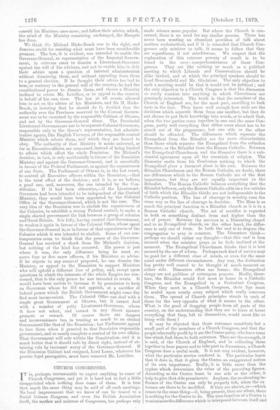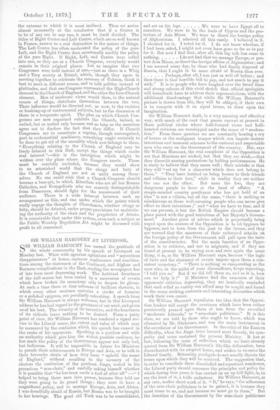CHURCH CONGRESSES.
IT is, perhaps, unreasonable to expect anything to come of
Church Congresses, and yet it is hard not to feel a little disappointed when nothing does come of them. It is true that much the same thing may be said of all such meetings. No local improvement that we know of can be traced to a Social Science Congress, and even the British Association itself, the mother and mistress of Congresses, has perhaps only made science more popular. But where the Church is con- cerned, there is no need for any similar process. There has never been wanting an abundant provision of talk about matters ecclesiastical, and if it is conceded that Church Con- gresses only minister to talk, it seems to follow that they are superfluous, if not mischievous. We suspect that the explanation of this extreme poverty of result is to be found in the over - comprehensiveness of these Con- gresses. They are like nothing so much as a political meeting to which Liberals and Conservatives should be alike invited, and at which the principal speakers should be Lord Beaconsfield and Mr. Gladstone. The only objection to such a meeting would be that it would not be political ; and the only objection to a Church Congress is that the discussion so rarely wanders into anything in which Churchmen are genuinely interested. The truth is that the members of the Church of England are, for the most part, unwilling to look facts in the face. They know well enough how wide are the divisions which separate them from one another, but they do not choose to put their knowledge into words, or to admit that, when the two parties come together in one and the same Con- gress, pretty well everything that either cares about has to be struck out of the programme, lest one side or the other should be offended. The differences which separate the Evangelical from the Ritualist are far more characteristic than those which separate the Evangelical from the orthodox Dissenter, or the Ritualist from the Roman Catholic. Between the Evangelical Churchman and the Dissenter there is a sub- stantial agreement upon all the essentials of religion. The Dissenter omits from his Confession nothing to which the Evangelical gives a foremost place in his own. Between the Ritualist Churchman and the Roman Catholic, no doubt, there are differences which to the Roman Catholic are of the first importance, but they are not equally important to the Ritualist. The Roman Catholic believes everything that the Ritualist believes, only the Roman Catholic adds on a few articles of faith which the Ritualist thinks are not indispensable to the Catholic position. The line of cleavage in worship rims the same way as the line of cleavage in doctrine. The Mass is as much the principal function in a Ritualist church as it is in a Roman Catholic church. The act of sacrifice is regarded in both as something distinct from and higher than the act of prayer. Between the services in a Dissenting chapel and in an Evangelical church, on the other hand, the differ- ence is only one of form. In both the end is to dispose the congregation to pray in common. The Dissenters think— perhaps we should rather say thought—that this end is best secured when the minister prays as he feels inclined at the moment. The Evangelical Churchman thinks that it is best secured by the use of a form. Perhaps each kind of service may be good for a different class of minds, or even for the same mind under different circumstances. Any way, the distinction has pretty well ceased to be thought of much moment on either side. Dissenters often use forms ; the Evangelical clergy are not guiltless of extempore prayers. Really, there- fore, the Ritualist would feel most at home in a ,catholic Congress, and the Evangelical in a Protestant Congress. When they meet in a Church Congress, their lips must be sealed upon nearly. every subject which really concerns them. The spread of Church principles stands to each of them for the very opposite of what it means to the other. What is the good of dragging people from all parts of the country, on the understanding that they are to leave at home everything that they, left to themselves, would most like to bring with them ? It may be objected that these extremes constitute but a small part of the members of a Church Congress, and that the people who really profit by it are the Centre party, who have dome ties which link them to both extremes. They are the strength, it is said, of the Church of England, and in collecting them together to hear papers and to take part in discussions, a Church Congress does a useful work. It is not very evident, however, what the particular service rendered is. The particular harm that it does is, that it gives the Centre an exaggerated notion of its own importance. Really, it is little more than the cypher which determines the value of the preceding figures. According as the Centre leans. to one side or the other, it help to give that side prominence. Anyhow, the moderating in- fluence of the Centre can only be properly felt, when the ex tremes are there to be modified. If they are absent, or—which comes to the same thing—if, being present, they are silent, there is nothing for the Centre to do. The true function of a Centre is to mimituise the difference which is interposed between itself and the extreme to which it is most inclined. Thus we arrive almost necessarily at the conclusion that if a Centre is to be of any use to any one, it must be itself divided. The titles of Right Centre and Loft Centre, which are so well known in France, answer to a real distinction in the nature of things. The Left Centre has often moderated the policy of the pure Left, and the Right Centre does occasionally modify the policy of the pure Right. If Right, Left, and Centre were rolled into one, as they are at a Church Congress, everybody would remain in their original places. Let us imagine that two Congresses were held instead of one,—just as there is a 'Whig and a Tory society at Bristol, which, though they agree in meeting together to celebrate the memory of Colston, think it best to meet in different rooms, and to talk politics instead of platitudes, and that one Congress represented the High-Church element in the Church of England, and the other the Low-Church element. Men of moderate views would then, in the natural course of things, distribute themselves between the two. Their influence would be directed not, as now, to the excision or hushing-up of controversial subjects, but to the discussion of them in a temperate spirit. The plan on which Church Con- gresses are now organised exhibits the Church, indeed, as united, but as united only because and so long as the members agree not to disclose the fact that they differ. If Church Congresses are to constitute a regular, though unrecognised, part in ecclesiastical machinery, something ought certainly to be done to get rid of the unreality which now belongs to them. "Everything relating to the Church of England may be freely debated in this Hall, except the things which excite
i real interest "—this is the inscription which might be written over the place where the Congress meets. These must be carefully excluded, because they would show to an astonished world that the clergy and laity of the Church of. England are not at unity among them- selves. No one could wish that a Church Congress should become a bear-pit, in which Ritualists who are all but Roman Catholics, and Evangelicals who are scarcely distinguishable from Dissenters, should fight for the amusement of their
audience. There is a wide interval between such an arrangement as this, and one under which the points which really engage the thoughts of Churchmen, whether clergy or laity, should be debated, under proper provisions for maintain- ing the authority of the chair and the proprieties of debate. It is conceivable that under this system, oven such a subject as the Public Worship Regulation Act might be discussed with profit to all concerned.

































 Previous page
Previous page